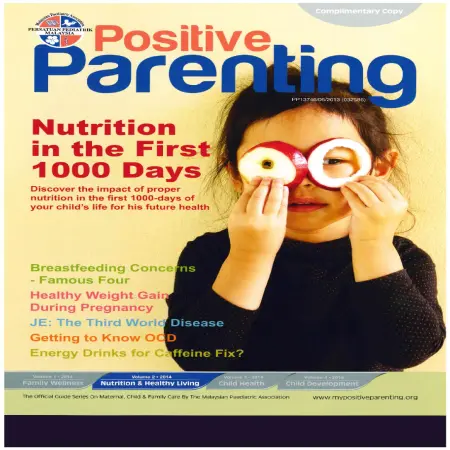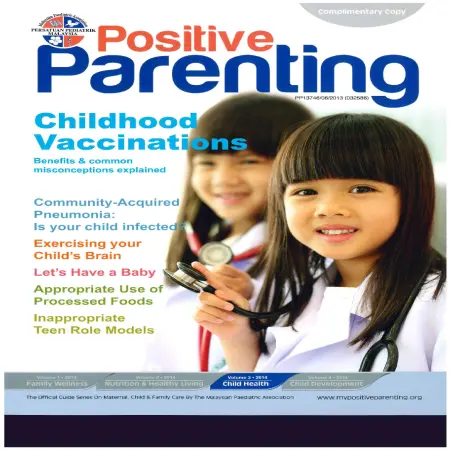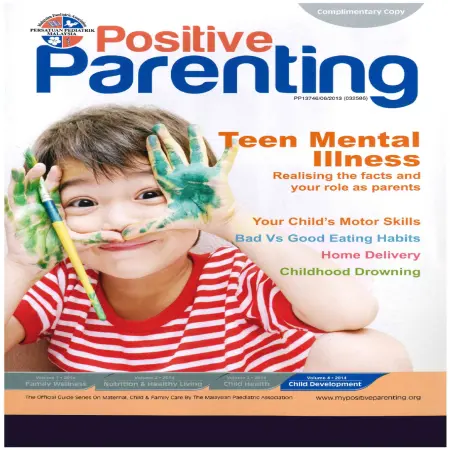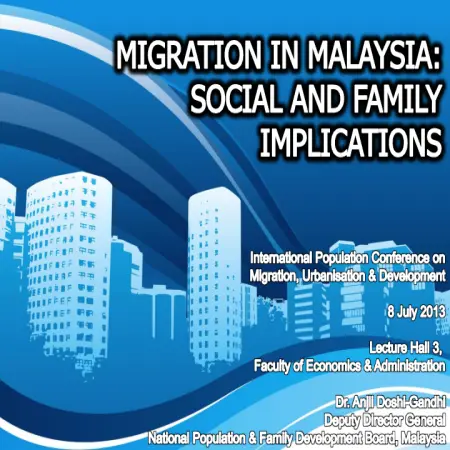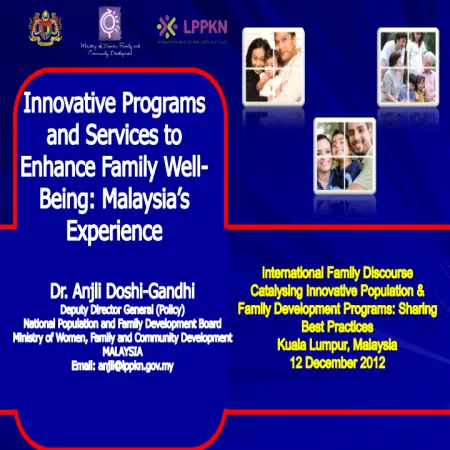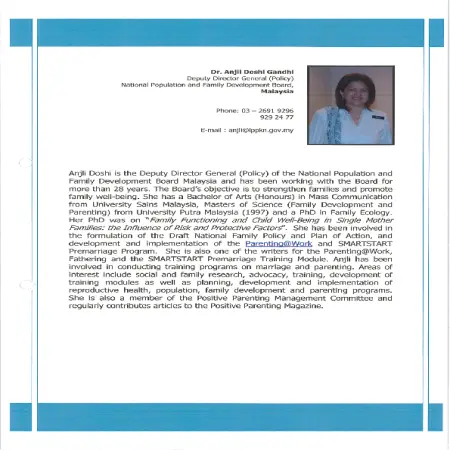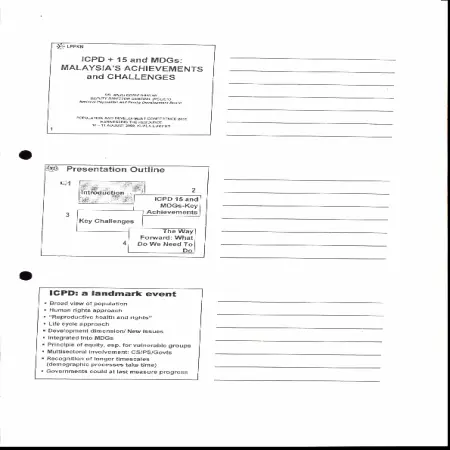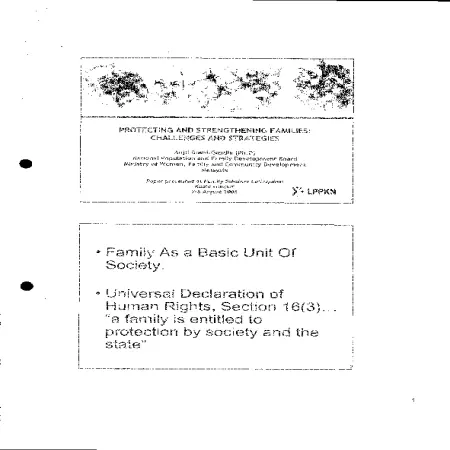Browse by Author
Results for Family Name : "Doshi-Gandhi" AND Given Name/Initial : "Anjli"
|
|
Outsourced parenting
Item Type: Article
Editor:
Year: 00/00/2014
Abstract: Housemaids have become an integral part of family life in Malaysia, some may say it’s a necessity – they provide much needed support to parents who often don’t have extended family around to assist with childcare or dual career parents who are often left with little choice and require help as well as support to carry out their family responsibilities.
It’s fair to say that commitment and devotion towards a successful career and rearing a child requires both sacrifice and no small amount of resolve and effort for either to work out in tandem. These and other factors prompt most parents to employ a housemaid, helper or caregiver to assist them in carrying out their roles and responsibilities. The notion being that maids would provide assistance to much needed help around the house and allow parents more freedom and time to spend with their children.
From things like potty training, to swimming and riding a bicycle, from learning not to bully other kids to learning from mistakes and forgiving other people for them. All these are lessons that can be outsourced to maids, helpers or even professionals. But just because it can, doesn’t mean that it should.
|
|
|
|
|
|
Hassle free travel with your kids
Item Type: Article
Editor:
Year: 00/00/2014
Abstract: Pick a destination with something for everyone to enjoy. A tour may seem like an easy way to see everything, but take it easy and don’t pack your tour schedule with too many activities especially if you have babies and toddlers with you. The key is to remain flexible.
|
|
|
|
|
|
Bringing up mentally challenged children
Item Type: Article
Editor:
Year: 00/00/2014
Abstract: Children who are mentally challenged are often referred to as being intellectually disabled. It is characterized by below-average intelligence or mental ability (i.e. learning, reasoning, problem solving, etc.) and a lack of adaptive behaviour required for day-to-day living (i.e. interpersonal skills, self-esteem, ability to follow rules/obey laws).
Numerous factors can facilitate its onset, but more noticeably; genetic predisposition (i.e. Down Syndrome), complications during pregnancy or childbirth (substance abuse), injury (i.e. near drowning), trauma (i.e. severe parental neglect) or an infection (i.e. meningitis).
|
|
|
|
|
|
Migration in Malaysia: social and family impact
Item Type: Conference or Workshop Item
Editor:
Year: 00/00/2013
Abstract: This paper highlights the key findings from surveys done by the Ministry of Women, Family and Community Development (MWFCD) and the National Population and Family Development Board (NPFDB). The Survey on the Implications of Employing Foreign Domestic Helpers (FDH) on the Family Institution in Malaysia was conducted by the MWFCD in 2009. The study found that many families rely on FDH for child care and domestic work. Some of the families find that having a FDH has a negative effect on their family relationships while some have no problems with it. The study on Indonesian Migrants in Tawau, Sabah conducted by the NPFDB in 2010 found that the local community in Sabah felt that the presence of Indonesian migrants in their community had both positive and negative effects. The effects of migrants were studied from the perspective of economy, education, health, safety, culture, housing and neighbourhood.
|
|
|
|
|
|
Innovative programs and services to enhance family well-being: Malaysia's experience
Item Type: Conference or Workshop Item
Editor:
Year: 00/00/2012
Abstract: Families constantly face new pressures and challenges due to rapid Industrialisation, modernisation and globalisation. Globalization in general brings benefits to families but it also creates risks and challenges that must be anticipated and adapted to. Hence, we have to be alert and responsive to future challenges that families will face and equip them with the necessary knowledge, skills as well as provide the needed services. As family is the most fundamental and important social unit, commitments at the highest level should be sought. Family well-being in Malaysia has been affected positively or negatively by development. Currently, Malaysian families face many challenges as a consequence of the changes in its structure, the increase in the proportion of nuclear families and changing lifestyles. Adaptations will have to be made so as not to lose the family support system, such as for child care, care of the elderly and the infirmed. Hence, the 3P Approach (Public, Private and People) which involves the partnership of multiple stakeholders such as the government, civil society and CSOs in ensuring that the present and future generation is more peaceful, secure, tolerant, prosperous and sustainable is most paramount in nation building. There are various innovative initiatives that have been undertaken in strengthening the family institution such as the National Family Policy, 1Malaysia Family First (1MF1st) and 1 Malaysia Youth and Empowerment Support (1MYes) under the National Blue Ocean Strategy, Strengthening of Marriage Institution (SmartStart Pre-Marriage Program), 1 Stop Family Centre, family education programmes such as KASIH Modules, Parenting@Work, Smart Belanja@Lppkn, Lppkn@Community and counselling programmes. Realizing that the happiness of the people and wellbeing of the family is an important goal in becoming a high income country by 2020, the government is developing its own model of the United Nations World Happiness Index. Currently, Malaysia is placed 51st among 156 countries. Meanwhile, a National Family Wellbeing Index developed by the Ministry Of Women, Family and Community Development through the National Population and Family Development Board in 2011 found that the Family Wellbeing Index is 7.55 out of 10. The Family Well-Being (FWB) Index consists of seven domains; Family Functioning, Economy, Health, Safety, Community, Religion and Spirituality, and Housing and Environment. The FWB Index indicates that Malaysian families have a relatively high level of wellbeing but more still needs to be done.
|
|
|
|
|
|
Family functioning and child well-being amongst urban Malay single mother families: resilence despite challenges
Item Type: Conference or Workshop Item
Editor:
Year: 00/00/2009
Abstract: This study was designed to determine the contribution of risk and protective factors in predicting urban Malay single mother's family functioning and child well being. In addition, this study examine the moderating role of protective factors (risk x protective factor interaction) on the relationship between risk factors and family functioning and child well-being. Result highlight the role of protective factors in promoting better family functioning and child well-being and the extent to which protective factor buffer risk factors in the design of intervention aimed at strengthening family functioning and enhancing child well-being in urban Malay single mother families.
|
|
|
|
|
|
ICPD + 15 and MDGS: Malaysia's achievement and challenges
Item Type: Conference or Workshop Item
Editor:
Year: 00/00/2009
Abstract: Population and development are inextricably linked. The ICPD helped place population concerns at the heart of sustainable development. Meeting the needs of women and men rather than on achieving demographic targets. Interrelationships between population, sustained economic growth and sustainable development: Population factors incorporated into development planning. Poverty alleviation programmes since the 1st OPP. This slides presentation is talk about ICPD + 15 and MDGS: Malaysia’s achievement and challenges.
|
|
|
|
|
|
Protecting and strengthening families: challenges and strategies - Malaysian perspective
Item Type: Conference or Workshop Item
Editor:
Year: 00/00/2006
Abstract: Over the past decade rapid transitions in Malaysian family structure and family life have occurred due to globalization, industrialization and socio-economic development. Education, economic activities, infusion of cultures, religion, migration, urbanization plus improvements in living standards all tend to have an impact on families and loosen the traditional structure. Some of the key changes that have reshaped Malaysian families include a smaller family size due to declining birth rate, increase in nuclear families, rise in marital break-up and single parent households and increased participation of women in the labour force by women. The traditional picture of a male breadwinner and female homemaker characterizes a smaller proportion of Malaysian families today. This paper focuses on the profile, issues and challenges confronting Malaysian Families, marriage, family relationships, need for balancing work and family life, role of father and impact of technology on the family. The role of the family in Malaysia is very crucial as the development of the human potential is a key component of the nine challenges as promulgated in Vision 2020. Various promotive, preventive and advocacy programmes and activities have been initiatives undertaken together with NG0s, the private and public sector as well as education and training institutions to ensure the strengthening of the family unit as well as helping families cope with the demands of contemporary living.
|
|
|
|





